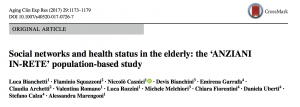In the last decades, our society has experienced a demographic change without precedents. The raise in life expectancy in the past 100 years has been about 80 times faster than in the previous 10,000 years. This has increased the prevalence of age-related chronic diseases in the population. Estimates suggest that people who suffered from dementia worldwide were 46.8 million in 2015, while they will reach 131.5 million in 2050. Not only these diseases challenge the sustainability of health care and welfare systems; they are jeopardizing pre-existing social structures, causing inter-generational tensions that reverberate into the social sphere of people. However, due to new needs and priorities of an ageing society, social structures are also creatively reconfiguring their functions to cope with these uncertainties. Therefore,
discovering social factors that can help us to preserve cognitive abilities of the elderly in the last years of life is key to understand how to rearrange institutions to cope with these uncertainties.
Research suggested that certain characteristics of the social infrastructure could help the elderly preserve his/her cognitive abilities and delay the onset of dementia. On the one hand, the number, variety and heterogeneity of social ties are helpful are important to have better cognitive stimuli as well as higher health literacy. On the other hand, when the cognitive abilities of the elderly are more compromised, strong social ties with dedicated caregivers are more important. Furthermore, while social networks are a person’s asset, research suggested that also a rich neighbourhood infrastructure, e.g., the presence of voluntary care associations, a simulating neighbourhood life and easily accessible transport and open space facilities, might have important implications.
SOCIABLE aims to fill this gap by studying the effect of the social infrastructure on the elder’s cognition in Brescia through a cross-disciplinary perspective that looks at: (1) the characteristics of social networks and neighbourhood social capital that can help preserve cognitive abilities or eventually improve the cognitive reserve of the elderly; (2) the mechanisms through which these social factors may give rise to formal/informal community welfare services that help to manage cognitive diseases, including the facilitating function of the urban infrastructure. Looking at these factors comprehensively is key to explore complex, integrated, socially distributed processes of disease management, which might ensure higher resilience and sustainability of social structures against uncertainties and changes.
This integrative perspective on social, health and urban infrastructure is also instrumental to: (3) inform infrastructure designers, caregivers and service professionals about organisational processes that might reduce negative/magnify positive effects of social infrastructure assets on cognition, which a medicalization-oriented outlook tends to neglect;
(4) create a research-action platform that links local stakeholders to envisage, coordinate and enact socially and economically feasible organisational paths that help the elderly and his/her relatives to cope with uncertainties and fragilities.


